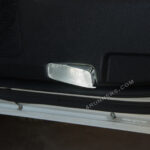The 2008 Toyota Camry Hybrid marked a significant step in blending fuel efficiency with the practicality of a mid-size sedan. A common concern for potential and current owners revolves around the lifespan and replacement cost of the hybrid battery. Let’s delve into the economics of owning a 2008 Toyota Camry Hybrid, specifically focusing on battery longevity and whether the fuel savings justify the potential battery replacement expense.
When considering the 2008 Toyota Camry Hybrid, it’s natural to weigh the advertised fuel economy against the realities of maintenance, particularly the hybrid battery. Early discussions in online forums, similar to the one we’re addressing, often bring up the initial cost premium of a hybrid vehicle and the looming question of battery replacement. One user in a forum highlighted this concern by contrasting the fuel costs of a 2008 Camry Hybrid with a standard gasoline Camry over 100,000 miles.
Calculations show that driving 100,000 miles in a 2008 Camry Hybrid, assuming 33 miles per gallon and a gas price of $3 per gallon, would cost approximately $9,091 in fuel. The same distance in a non-hybrid 2008 Camry, at 22 miles per gallon, would amount to roughly $13,636. This reveals a fuel savings of $4,545 over 100,000 miles.
However, the original forum post points out a critical factor: the cost of a replacement hybrid battery. If a battery replacement for a 2008 Toyota Camry Hybrid costs around $4,500, as mentioned in the forum, the fuel savings over 100,000 miles essentially just cover this potential battery expense. This simple calculation leads to the question: does the hybrid version truly offer a financial advantage, especially for drivers who primarily drive in the city where hybrid fuel efficiency is most pronounced?
It’s also important to consider the initial price difference between a 2008 Toyota Camry Hybrid and its non-hybrid counterpart. The forum post suggests a price premium of about $4,000 for the hybrid model. Factoring in this upfront cost, alongside the potential battery replacement expense, further complicates the financial argument for choosing the hybrid for purely economic reasons.
While the economic benefits might seem marginal based on these simplified calculations, it’s crucial to remember other factors. The environmental advantages of hybrid vehicles, though not directly financial, are a significant benefit. Furthermore, real-world battery life can vary, and many 2008 Toyota Camry Hybrid batteries have lasted well beyond 100,000 miles and even 150,000 miles, potentially delaying or even eliminating the need for replacement during the vehicle’s lifespan for many owners.
In conclusion, while the straightforward fuel savings of a 2008 Toyota Camry Hybrid might appear to be offset by the battery replacement cost, a deeper look reveals a more nuanced picture. The longevity of the original battery can significantly impact the long-term cost-effectiveness. For those prioritizing fuel efficiency and environmental impact, the 2008 Toyota Camry Hybrid remains a compelling option, even when considering potential battery maintenance costs. The decision ultimately depends on individual driving habits, long-term ownership plans, and priorities beyond mere financial calculations.
